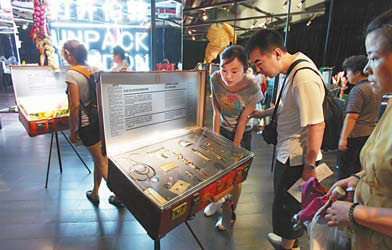Third time green for London
 |
| Tourists visit the London Case Pavilion at the Expo Garden on Monday as the London Week kicks off. |
The environmental legacy of the 2012 Olympics is part of London's goal to become the world's greenest city by 2020, English officials said as the London Week kicked off at the Expo Garden on Monday.
London's preparations for hosting the world's biggest sporting event for a record third time hinge on turning a heavily polluted area in the city's overlooked east into a 110-hectare park that will "shift the city's center of gravity eastwards a bit", said Peter Bishop, deputy chief executive of the London Development Agency (LDA).
The 2012 Olympic organizers are also creating new stadiums that can be disassembled and rebuilt in other parts of the country to avoid their traditional fate as white elephants, added Bishop.
Meanwhile, London Mayor Boris Johnson will launch a 70-million-pound ($106 million) bike-rental scheme, modeled on the French city of Lyon's moderately successful Velo'V campaign, on Friday.
Johnson, who has described the Olympics as the biggest event in the city in 50 years, hopes the scheme creates an extra 40,000 bike journeys a day to cut air pollution.
His ambitious plan to reduce the capital's carbon footprint by 60 percent by the year 2025 has seen the London Transport Authority roped into announcing a new fleet of hybrid buses for 2012.
At the same time, city officials are busy retro-fitting 1.8 million properties with everything from insulated lofts to friendlier light bulbs to meet this goal. A bulk, or 40 percent, of London's carbon emissions derive from heating houses.
Shanghai took a similar approach to London when sculpting the Expo Garden out of a former industrial wasteland on the banks of the Huangpu River. It is also using the Expo as a testing-ground for electric buses and hydrogen-cell cars, and has newly introduced rent-a-bike schemes in parts of the city.
"The legacy of the 2012 Games is that it is a green city, and that involves not just the infrastructure of the Olympics, that involves cycle lanes (and) energy-efficient adapted retro-fitted houses," said Richard Barnes, the statutory deputy mayor of London.
"What will be a great legacy will be the education of the people of London, that they must think and be greener, that they must not waste energy (or litter)," he said.
Barnes was scheduled to join other officials, including his counterpart in Shanghai and several Chinese Olympic and Paralympic athletes, at the UK Pavilion on Tuesday for an event marking the official two-year countdown to the 2012 Games.
London's re-branding of itself as a low-carbon city is, at least in part, aimed at capitalizing on a lucrative industry for green products and services, which is forecast to reach 2.2 trillion euros ($2.8 trillion) by 2020.
The city boasts over 30 percent green space and is in the process of building a decentralized energy network to further trim waste.
By 2016, it will expect all of its new housing to meet the basic environmental standards mapped out by London's ZED Pavilion in the Expo's Urban Best Practices Area, he said.
 0
0 






